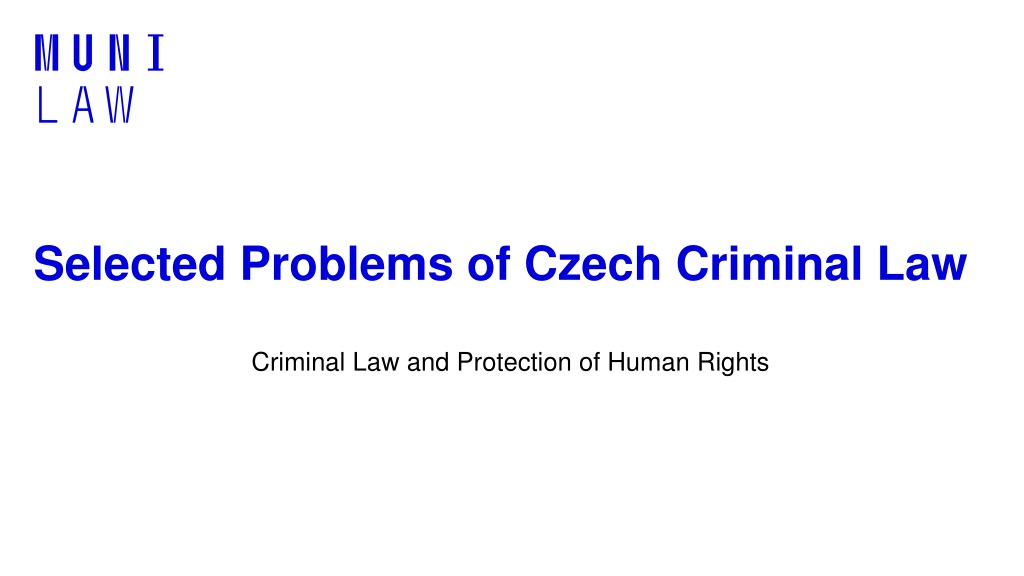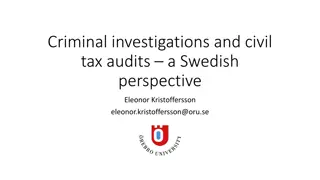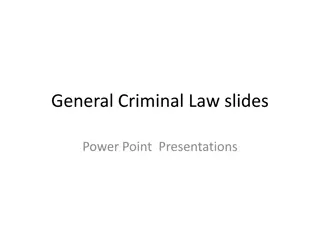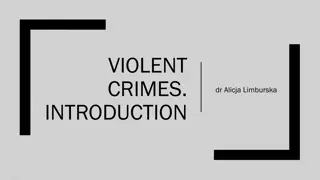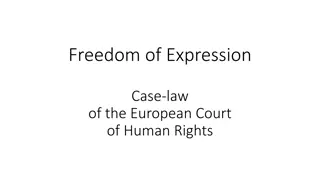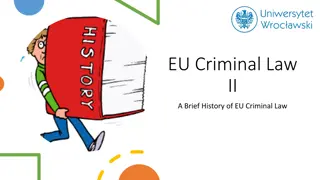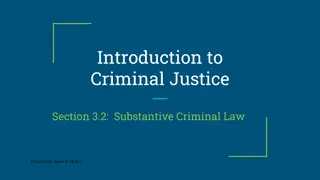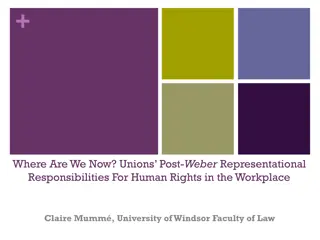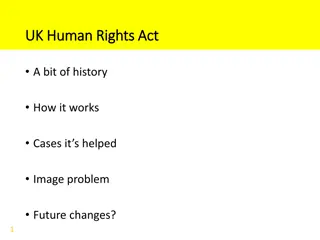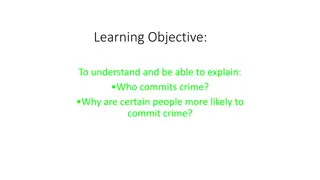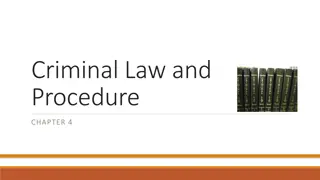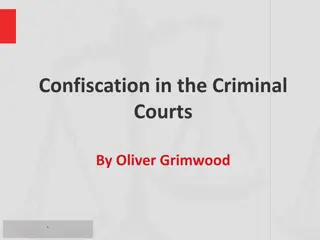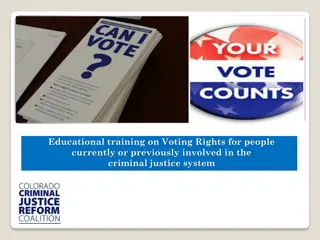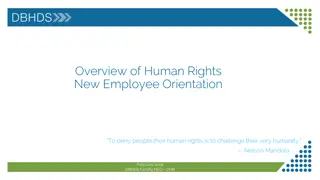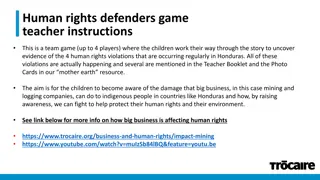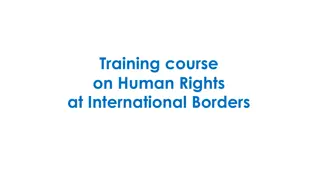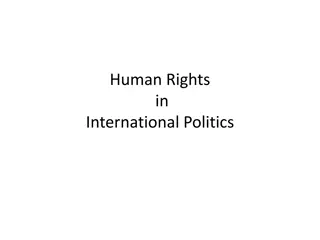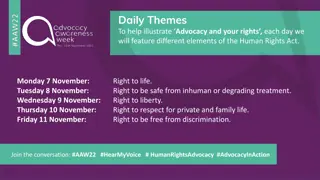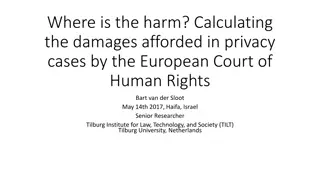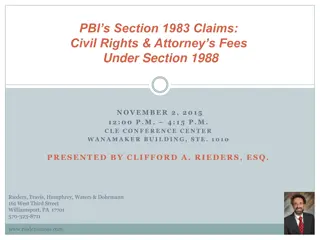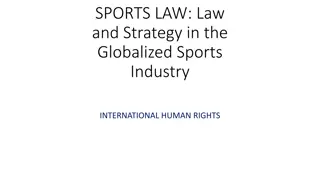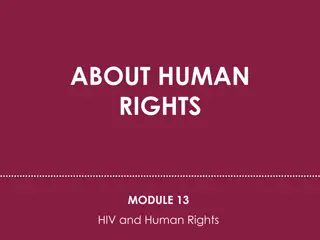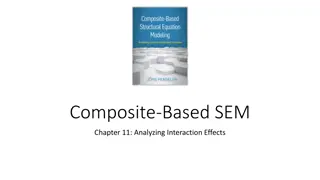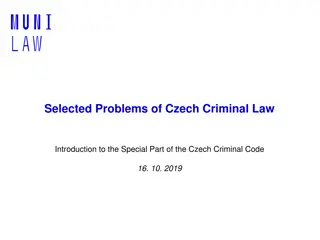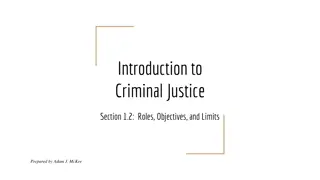Analysis of Criminal Law and Human Rights Interaction
Explore the complex relationship between criminal law and human rights, delving into limitations, foreseeability, and interaction in modern democratic states with a focus on the protection of individual and collective interests. The interplay between criminal liability and human rights is analyzed, shedding light on key issues and considerations.
Uploaded on Sep 30, 2024 | 0 Views
Download Presentation

Please find below an Image/Link to download the presentation.
The content on the website is provided AS IS for your information and personal use only. It may not be sold, licensed, or shared on other websites without obtaining consent from the author. Download presentation by click this link. If you encounter any issues during the download, it is possible that the publisher has removed the file from their server.
E N D
Presentation Transcript
Selected Problems of Czech Criminal Law Criminal Law and Protection of Human Rights
Human Rights in Modern State Modern democratic state with rule of law the whole reason of existence is to serve people the priority of individual against the state constant weighing of conflicting interests narative from perspective of an individual Human rights aim means obstacle 2 Criminal Law and Protection of Human Rights
Modern criminal law Most flagrant and powerful expression of state power Subsidiary nature Protection of individual interests against their most severe breaches Protection of collective interests necessary for the fulfillment of the functions of modern democratic state based on rule of law 3 Criminal Law and Protection of Human Rights
Interaction of Criminal Law and Human Rights Criminal law typically interferes with human rights of one person for sake of protection of human rights of another Human rights (co)define the scope of protection (criminal liability) limits the outcome of this protection (criminal sanctions) (co)define the basic framework of law enforcement (procedure) All of this applies in both ways limits (negative) and requirements (positive) On the next slides, only a few chosen issues are analysed 4 Criminal Law and Protection of Human Rights
Criminal liability interaction limitations foreseeability of criminal law regulation the perpetrator must know, which behaviour is criminalized and what sanctions may follow from its breach (ECHR Ashlarba v. Georgia, 45554/08) possible necessity of knowing the case law does not mind (ECHR Konov v. Latvia, 36376/04) general or uncertain terms do not mind (ECHR Huhtamaki v. Finland, 54468/09) possible necessity of consulting an expert does not mind (ECHR Achour v. France, 67335/01) necessary use of common sense does not mind (ECHR Moiseyev v. Russia, 62936/00) Criminal Law and Protection of Human Rights 5
Criminal liability interaction limitations What migh constitute a breach of foreseeability analogy to the detriment of the perpetrator (ECHR C eme v. Belgium, 32492/96, 32547/96, 32548/96) surprising interpretation of a term that has not been interpreted so far (ECHR Liivik v. Estonia, 12157/05) surprising interpretation of a term in another case after the act was committed (ECHR Alimu aj v. Albania, 20134/05) surprising interpetation solving an unstable case-law, which has changed repeatedly (ECHR Contrada v. Italy, 66655/13) 6 Criminal Law and Protection of Human Rights
Criminal liability interaction limitations When change of case law does not mind the change followed an obvious continual trend of case-law (ECHR C. R. v. UK, 20190/92) the change was expectable due to an obvious development of society (ECHR S.W. v. UK, 20166/92) the change was a result of a change of legislation (ECHR Martirosyan v. Armenia, 23341/06) 7 Criminal Law and Protection of Human Rights
Criminal liability interaction requirements Human rights might request certain behaviour to be criminalized ECHR(GC) Osman v. UK, no. 23452/94 typically intentional killing, civil law liability may suffice for negligent killing (ECHR(GC) Calvelli and Ciglio v. Italy, 32967/96) rape (ECHR M.C. v. Bulgaria, 39272/98) sexual abuse of a mentally handicaped person (ECHR X. and Y. v. the Netherlands, 8978/80) 8 Criminal Law and Protection of Human Rights
Criminal sanctions limitations Typically cruel, inhuman or degrading punishment What wasn t found as cruel, inhuman or degrading: slippering three times on buttocks with a rubber-soled gym shoe in private by the headmaster of his boarding school (ECHR Costello-Robers v. UK, 13134/87) What was: spanking three times by a birch on bare posterior on a police station while other policemen watching (ECHR Tyler v. UK, 5856/72) 9 Criminal Law and Protection of Human Rights
Criminal sanctions requirements Possibility of release on parole even for convicts sentenced for life (ECHR GC Vinters and other v. UK, 66069/09, 130/10 and 3896/10) Real opportunity for rehabilitation as a necessary element of each restraint of freedom by punishment (ECHR GC James, Wells, Lee v. UK, 25119/09, 57715/09 a 57877/09) Sufficiently foreseeable and precise conditions, it can even be ensured with foreseeable requirements of presidential clemency (ECHR Harakhiev and Tomulov v. Bulgaria, 15018/11 and 61199/12) 10 Criminal Law and Protection of Human Rights
Criminal procedure limitations Nemo tenetur principle privilege against self-incrimination basically covers only righ to remain silent, not also compulsory extraction of evidence independent on will of the defendant (ECHR GC Saunders v. UK, 19187/91) but if the level of compulsion exceeds certain level, this principle might be triggered (ECHR GC Jalloh v. Germany, 54810/00) 11 Criminal Law and Protection of Human Rights
Criminal procedure requirements Right to a defence counsel delay might breach privilege against self-incrimination delay only for compelling reasons and without prejudice to rights to defence (ECHR GC Salduz v. Turkey, 36391/02) when instruction on right to remain silent and to have an attorney is missing, it is very likely that violation will be found (ECHR GC Beuze v. Belgium, 71409/10) necessity to assess overall fairness of the proceedings (ECHR GC Ibrahim and others v. UK, 50541/08, 50571/08, 50573/08 and 40351/09): 12 Criminal Law and Protection of Human Rights
(a) Whether the applicant was particularly vulnerable, for example, by reason of his age or mental capacity. (b) The legal framework governing the pre-trial proceedings and the admissibility of evidence at trial, and whether it was complied with; where an exclusionary rule applied, it is particularly unlikely that the proceedings as a whole would be considered unfair. (c) Whether the applicant had the opportunity to challenge the authenticity of the evidence and oppose its use. (d) The quality of the evidence and whether the circumstances in which it was obtained cast doubt on its reliability or accuracy, taking into account the degree and nature of any compulsion. (e) Where evidence was obtained unlawfully, the unlawfulness in question and, where it stems from a violation of another Convention Article, the nature of the violation found. 13 Criminal Law and Protection of Human Rights
(f) In the case of a statement, the nature of the statement and whether it was promptly retracted or modified. (g) The use to which the evidence was put, and in particular whether the evidence formed an integral or significant part of the probative evidence upon which the conviction was based, and the strength of the other evidence in the case. (h) Whether the assessment of guilt was performed by professional judges or lay jurors, and in the case of the latter the content of any jury directions. (i) The weight of the public interest in the investigation and punishment of the particular offence in issue. (j) Other relevant procedural safeguards afforded by domestic law and practice. 14 Criminal Law and Protection of Human Rights
Entrapment three steps test (ECHR Matanovic v. Croatia, 2742/12): preliminary: is there an arguable complaint of entrapment? substantial: would the offence have been committed without the autorities intervention? authorities must remain essentially passive procedural: does the national law provide sufficient instruments to efficiently deal with the claim of entrapment? -> exclusion rule, defence of entrapment, similar consequences burden of proof rests on prosecution (ECHR Lagutin and others v. Russia, 6228/09, 19123/09, 19678/07, 52340/08 a 7451/09) 15 Criminal Law and Protection of Human Rights
Essentially passive Not given, when (ECHR Virgil Dan Vasile v. Romania, 35517/11) taking the initiative in contacting the suspect repeating the offer to buy drugs after it was refused raising the price urging persistently appealing on emotion (e.g. begging because of abstinence syndrome) 16 Criminal Law and Protection of Human Rights
Who can be the entrapping agent? Police or other law enforcement agency officer Private person, who is a police informant the same criteria as with police agent (ECHR Burak Hun v. Turkey, 17570/04) it is sufficient to conclude that the person has repeatedly cooperated with the police (ECHR Veselov and others v. Russia, 23200/10, 24009/07 and 556/10) Third person who reported to the police that a crime has gone on his/hers active initiative is not entrapment (ECHR GC Bykov v. Russia, 4378/02) 17 Criminal Law and Protection of Human Rights
How to tell that the person would commit the crime on his/hers own? Being member of an organized group (ECHR Burak Hun v. Turkey, 17570/04) Having drugs at home, report of a narcoman that the person in question is a supplier (ECHR Sepil v. Turkey, 17711/07) Selling drugs after being asked, but under ordinary conditions (ECHR Scholer v. Germany, 14212/10) Offering the drugs to the agent out of own initiative (ECHR Sequiera v. Portugal, 73557/01) 18 Criminal Law and Protection of Human Rights
What is insufficient to conclude that the person would commit the crime on his/hers own? previous drugs addiction (ECHR Constantia and Stoian v. Romania, 23782/06 and 46629/06) getting the drugs when all initiative is on the agent (ECHR Ciprian Vl du and Ioan Florin Pop v. Romania, 43490/07 and 44304/07) Clean criminal record, not having drugs at home, obtaining only the ammout that the agent asked for, not being prosecuted for related suspicions, being connected to agent via an intermediary, who was in cahoot with the police (ECHR Teixeira de Castro v. Portugal, 25829/94) 19 Criminal Law and Protection of Human Rights
Thank you for your attention! JUDr. Jan Provazn k, Ph.D. Assistant Professor Department of Criminal Law Office: room no. 226 Consultation hours: Wednesdays 11:40 - 12:40 E:mail: jan.provaznik@law.muni.cz 20 Criminal Law and Protection of Human Rights
